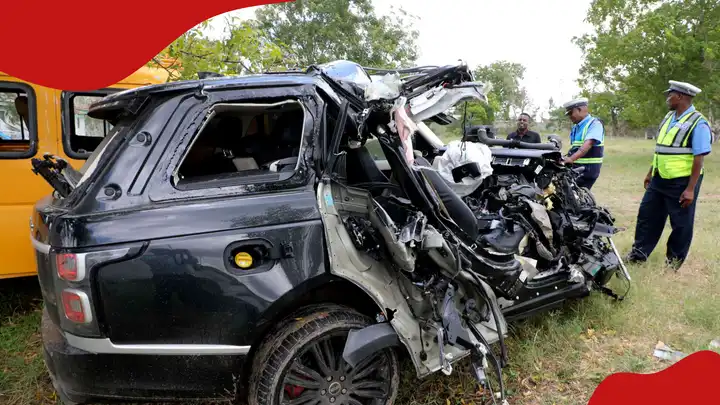What Happens When a Brand-New Car Crashes Before Reaching Its Owner?
A tragic accident involving a brand-new Range Rover and a canter truck along the Mombasa-Nairobi Road has left Kenyans with many questions about who will compensate the buyer of the luxury vehicle.
The accident, which occurred at the Maji ya Chumvi area, resulted in the Range Rover being completely written off.
According to the police report, the accident happened on Tuesday, August 27, when the Range Rover, driven by 37-year-old Jamal Mubarak, collided head-on with an FRR Isuzu canter.
The collision occurred while Mubarak was attempting to overtake another vehicle at high speed. The crash led to the tragic deaths of two people on the spot and left three others injured.
The incident sparked widespread speculation and concern about who would bear the loss of the expensive vehicle.
J.V. Mwongole, an advocate of the High Court of Kenya, provided insights into this complex situation, outlining three key factors that must be considered when determining who will bear the loss.
The first crucial factor, according to Mwongole, is identifying when the ownership and risk transfer occurred from the car dealer to the buyer.
He explained that if the contract between the buyer and the dealer specifies that the risk is transferred to the buyer upon delivery, then the dealer would be responsible for the loss.
Conversely, if the contract states that the risk is transferred to the buyer at the time of the sale, then the buyer would bear the loss.
“If the contract specifies that the risk passes to the buyer upon delivery of the car, the dealer might have to bear the loss,” Mwongole explained.
“On the other hand, if the contract stipulates that ownership and all associated risks transfer to the buyer at the time of sale, then the buyer could be held responsible for the loss.”
The second factor to be considered is the person who contracted the driver to deliver the vehicle. Mwongole pointed out that if the driver was hired by the car dealer, and it is determined that the driver’s negligence caused the accident, the dealer might be held liable for the damages.
However, if the buyer had hired the driver and given him explicit permission to deliver the car, then the buyer might be held responsible, especially if it is established that the driver’s actions led to the crash.
“For instance, if the driver was employed by the dealer and acted as the dealer’s agent or employee, the dealer might be liable for damages if negligence on the driver’s part is proven,”
Mwongole said. “Similarly, if the buyer hired the driver and he was acting under the buyer’s instructions to deliver the car, the buyer might bear the loss if the driver’s negligence caused the accident.”
The third and final factor highlighted by Mwongole is whether the car was insured during delivery.
If the vehicle was insured before the accident, the insurance company would be responsible for covering the damages according to the terms of the policy.
However, if the car was not insured, the responsibility for the loss would fall back on either the buyer or the dealer, depending on the specifics of their contract.
“If the vehicle was insured, the insurance company should cover the damages as per the policy terms,” Mwongole stated.
“But if it wasn’t insured, the decision on who bears the loss will depend on the nature of the contract between the buyer and the dealer.”
This tragic incident has brought attention to the importance of understanding the terms of contracts and ensuring proper insurance coverage when purchasing and delivering vehicles.
The questions raised by this case highlight the need for clarity and protection for both buyers and sellers in such transactions.


